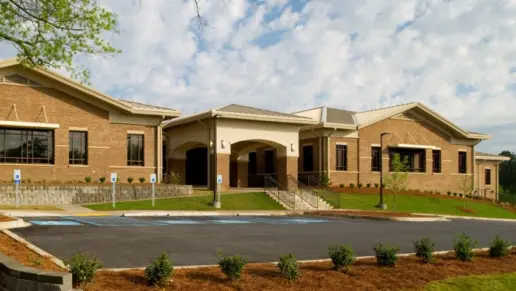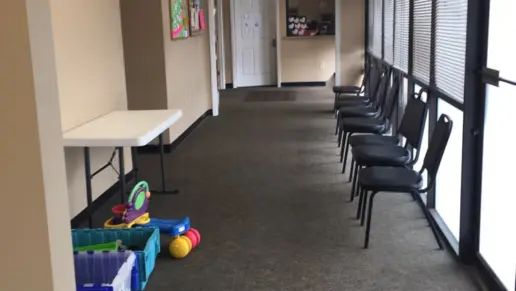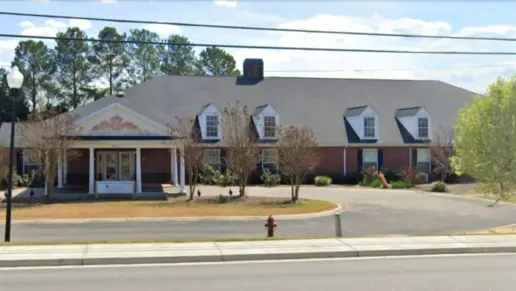About Sumter Behavioral Health Services
Freedom House is a residential drug and alcohol rehab center for women in Sumter, South Carolina. This is a 13 bedroom house that operates under Sumter Behavioral Health Services. The residence is open to women who are currently in an addiction treatment program or just finished one and want a sober place to live as they transition back into society. They accept most kinds of commercial insurance, self payment, Medicaid, and Tricare.
The program requires 40 hours of participation each week, or eight hours a day, and most women stay in it for about three to six months. They live in a comfortable setting that’s designed to feel as homelike as possible. During their stay, they’ll learn teamwork, cooperation, and independent living skills.
If clients have been separated from their families due to substance abuse, they’ll take steps to reunify with them while they’re in the program. The daily schedule includes basic household chores, meditation, and group therapy sessions with certified counselors. Clients may also travel to attend outpatient services at another facility and then return to the residence.
Facility Overview
Rehab Score
Gallery
Other Forms of Payment
Private insurance refers to any kind of healthcare coverage that isn't from the state or federal government. This includes individual and family plans offered by an employer or purchased from the Insurance Marketplace. Every plan will have different requirements and out of pocket costs so be sure to get the full details before you start treatment.
Self-pay involves paying for treatment out of your own pocket. You can use savings or credit, get a personal loan, or receive help from family and friends to fund your treatment. If you don't have insurance or your insurance plan doesn't cover a specific program, self-pay can help ensure you still get the care you need.
Financial aid can take many forms. Centers may have grants or scholarships available to clients who meet eligibility requirements. Programs that receive SAMHSA grants may have financial aid available for those who need treatment as well. Grants and scholarships can help you pai for treatment without having to repay.
Sliding scale payments are based on a client's income and family size. The goal is to make treatment affordable to everyone. By taking these factors into account, addiction recovery care providers help ensure that your treatment does not become a financial burden to you or your family, eliminating one barrier to care.
Medicaid is a state based program that helps lower-income individuals and families pay for healthcare. Medicaid covers addiction treatment so those enrolled can use their coverage to pay for rehab. When a program accepts Medicaid the client often pays very little or nothing out of their own pocket.
Military members, veterans, and eligible dependents have access to specific insurance programs that help them get the care they need. TRICARE and VA insurance can help you access low cost or no cost addiction and mental health treatment. Programs that accept military insurance often have targeted treatment focused on the unique challenges military members, veterans, and their families face.
Addiction Treatments
Levels of Care
Treatments
The goal of treatment for alcoholism is abstinence. Those with poor social support, poor motivation, or psychiatric disorders tend to relapse within a few years of treatment. For these people, success is measured by longer periods of abstinence, reduced use of alcohol, better health, and improved social functioning. Recovery and Maintenance are usually based on 12 step programs and AA meetings.
Choosing a drug rehab in South Carolina helps you overcome drug dependency, learn how to manage cravings, and obtain the tools needed to prevent relapse. This is accomplished through individualized treatment that addresses a full spectrum of physical, social, and emotional needs.
Many of those suffering from addiction also suffer from mental or emotional illnesses like schizophrenia, bipolar disorder, depression, or anxiety disorders. Rehab and other substance abuse facilities treating those with a dual diagnosis or co-occurring disorder administer psychiatric treatment to address the person's mental health issue in addition to drug and alcohol rehabilitation.
Opioid rehabs specialize in supporting those recovering from opioid addiction. They treat those suffering from addiction to illegal opioids like heroin, as well as prescription drugs like oxycodone. These centers typically combine both physical as well as mental and emotional support to help stop addiction. Physical support often includes medical detox and subsequent medical support (including medication), and mental support includes in-depth therapy to address the underlying causes of addiction.
Substance rehabs focus on helping individuals recover from substance abuse, including alcohol and drug addiction (both illegal and prescription drugs). They often include the opportunity to engage in both individual as well as group therapy.
Programs




Clinical Services
Group therapy is any therapeutic work that happens in a group (not one-on-one). There are a number of different group therapy modalities, including support groups, experiential therapy, psycho-education, and more. Group therapy involves treatment as well as processing interaction between group members.
Individual Therapy is a planned face-to-face intervention that is often useful in assisting the client in improving their emotional and behavioral functioning. Client’s unique stressors are often generational in nature and immensely extensive and affect their families as well as themselves. Individual therapy can enhance the client’s capacity to identify maladaptive behaviors and cognitions allowing them to identify more appropriate alternatives. They will learn to utilize new strategies to make beneficial lasting lifestyle changes which help to promote more adaptive behaviors.
Trauma therapy addresses traumatic incidents from a client's past that are likely affecting their present-day experience. Trauma is often one of the primary triggers and potential causes of addiction, and can stem from child sexual abuse, domestic violence, having a parent with a mental illness, losing one or both parents at a young age, teenage or adult sexual assault, or any number of other factors. The purpose of trauma therapy is to allow a patient to process trauma and move through and past it, with the help of trained and compassionate mental health professionals.
Whether a marriage or other committed relationship, an intimate partnership is one of the most important aspects of a person's life. Drug and alcohol addiction affects both members of a couple in deep and meaningful ways, as does rehab and recovery. Couples therapy and other couples-focused treatment programs are significant parts of exploring triggers of addiction, as well as learning how to build healthy patterns to support ongoing sobriety.
Chemically dependent families have a unique system that seeks to provide stability in spite of drug usage. Understanding the family system, its roles, rules, and structure allows participants to understand how their addiction has affected their loved ones. It will help everyone recognize and understand the changes within the family as everyone adapts. Group interaction with family participation can develop an understanding that chemical dependency of any member of the family, indicates family pain and is not solely experienced by the chemically dependent person.
The purpose of the Psychosocial Rehabilitative Services (Life Skills) face-to-face service is to assist the client in the restoration or strengthening of skills needed to promote and sustain independence and stability in their living, learning, social and work environments.
Amenities
-
Residential Setting
Accreditations

The Commission on Accreditation of Rehabilitation Facilities (CARF) is a non-profit organization that specifically accredits rehab organizations. Founded in 1966, CARF's, mission is to help service providers like rehab facilities maintain high standards of care.
CARF Accreditation: Yes
Contact Information
221 West Liberty Street
Sumter, SC 29150


